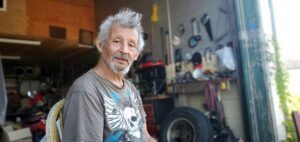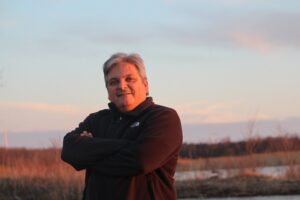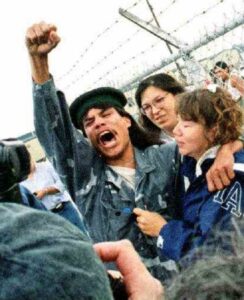Ipperwash Summer Series: Alive for a reason: Talking with Ipperwash survivors about mental health – Part 2
September 6, 2020, will mark the 25th anniversary of the shooting death of unarmed protestor Anthony “Dudley” George by an Ontario Provincial Police sniper at Ipperwash Beach. The Anishinabek News will feature an Ipperwash Summer Series to highlight the history, trauma, aftermath, and key recommendations from the 2007 Report of the Ipperwash Inquiry. First Nations in Ontario understood that the Inquiry would not provide all of the answers or solutions, but would be a step forward in building a respectful government-to-government relationship.
For information on the 2007 Report of the Ipperwash Inquiry, please visit: http://www.attorneygeneral.jus.gov.on.ca/inquiries/ipperwash/closing_submissions/index.html
Warning: This article contains mature subject matter and explicit language. Reader discretion is advised.

By Monica Virtue
Documentary filmmaker Monica Virtue recently met with three members of Chippewas of Kettle & Stony Point First Nation to talk about trauma and mental health surrounding the lived experience of the Ipperwash Crisis.
Perry “Pierre” George, a grandfather of two, shares how he was impacted by the experience of driving his brother Anthony “Dudley” George to the hospital on the night of September 6, 1995, after Dudley had been shot by an Ontario Provincial Police (OPP) sniper outside of Ipperwash Provincial Park. Stacey “Burger” George, a father of two, shares how he was affected by the experience of standing next to Dudley as seven officers opened fire on them and a crowd of fellow land protectors at the entrance of the park. Doug George, the Director of Kettle & Stony Point Health Services, shares his perspective on how the trauma experienced by the survivors of the “Ipperwash Crisis” forms part of the community’s story. While Pierre, Burger and Doug were interviewed separately, their words often echo each other and offer a window into how the community can continue to heal. Part 1 of the interview available here.
On recovering as a community:
MONICA VIRTUE (MV): Pierre, do you know Doug George? He lives at Kettle Point, and is the head of Health Services there. He said that Indigenous people generate knowledge through stories, and by retelling the same story over and over with their trauma in the story, it becomes a part of the fabric of a community. So, he said a way to help people recover from PTSD is…
PERRY “PIERRE” GEORGE (PIERRE): You never recover from it. Never. All they do is teach you that if you start getting the thoughts in your head, you try to start to push them back here [puts his hand on the back of his head]. And think about all the best times in your life. The best things. Just keep thinking that. And that will help push that thing to the back. They said, “It will be there always.”
MV: Doug said when people tell stories about trauma, they’re talking from the perspective of feeling helpless. But they can start to re-tell the story in a way where they feel like they’re taking their power back. I think that’s what you’re saying, in a way?
PIERRE: Well, I got it back. See, I went about five years of that post-trauma training in Sarnia. And this lady was good — real good at her job. She sat there and talked to me, and tells me this and tells me that. She checked my eyes and everything like that. She did the whole thing. And I’m just thinking — at least somebody is listening to me!
MV: Is that something you would recommend? For people here [at Stoney Point] — people who were involved in it that night — is going to that kind of counselling?
PIERRE: In a way, yeah. But like I says, I know a few of them. I think they don’t want to take that step. I don’t care if it hurts you. F*****g get it out of you. Get it where it’s supposed to go instead of sitting there and suffering every day. It changes your personality too, see.
DOUG GEORGE (DOUG): It takes a lot of energy to be able to tell your story within the seat of trauma. Now, a community of people is a bunch of people all together sharing a common experience. And sometimes we come from communities of people who share trauma.
The rule around it is you’re not allowed to talk about it. You’re not allowed to do anything about it. Right? Because people don’t want to hear the story. But in fact, if you have a major trauma that’s really impacted the community, what you need to do is help the community talk about that story as a collective, as a group — so that they can unburden and they can know that there’s other people that are feeling the same way as them. That lifts the energy up and makes it easier, I think.
It feels awful at first, because it’s just energy that’s moving and people are not comfortable in that process. But once that starts moving, then that trauma starts lifting off of people on a larger scale versus an individual. So, it’s hard for one individual who heals themselves and comes back to their community and tries to heal other people in their community. It’s just a very monotonous, slow process because then you have to try to educate people about healing. But if you have more than one person — you have like, say, five people — then there’s this exponential type of healing that starts to go out in a community and people feel that.
On coming into your power:

MV: How have you coped with all of this? You’ve seen so many crazy things.
PIERRE: I just gotta live with it. I was talking to a lady out in Forest. She was asking me, “How many lives do you got?” I don’t know. You gotta talk to the Big Guy [points to the sky] because He’s the one that runs everything. Whether you live or die — He’s the one. See, and I’m still here living. But why? There’s something here I still gotta do. I’m not quite sure what it is — but there’s something I gotta do here yet before my time’s up.
MV: Why do you think that you keep on having these brushes with death?
STACEY “BURGER” GEORGE (BURGER): I don’t know. I’ve been asked that, like, “Burger, you’ve been through so much traumatic experiences. You should literally write a book.” And I did. I started one, but I lost it. And then I wrote another book and it was my healing journey of how I overcome drugs and my counselling and Red Path. I literally had a healing book.
DOUG: Once you tell the story, then what happens is you come into your power. Once you process the energy, or go through whatever you want to call it — catharsis — at the end of it you’re able to see clearly. The brain starts making up a different story. When you first started, the brain was making up a book about all the awful stuff that happened. After you go through the process of healing you go, “Oh, now I see why that happened to me. Alright. I am resilient. I became resilient through the process. I can see how resilient I really am.” That in turn empowers people.
Now, healing doesn’t happen just once. It’s a lifetime process. That’s only because we have many, many wounds…But if you have very light energy about you — and when I’m talking about light, I’m talking about the ability to connect to your own self and connect to spirit — then you have a sense of purpose. You’re able to connect to people. You enjoy waking up and being a part of creation. And you start seeing things again and you go, “Wow, look at that sunrise. Look at that sunset.” That’s a lighter energy, versus going around angry at everybody and angry at the world all the time. That’s such a burden to carry all your life. Why do people choose to carry all of that when they can choose to carry much lighter energy with them?
On finding peace:

BURGER: I literally ruined my voice from yelling. From protesting. That’s why my voice is raspy. I have a hard time talking sometimes.
MV: That’s how people know you. The general public would know you from that photo. You were the face of the Ipperwash Crisis, in a way, because of that one photo of you. The media always used it over and over.
BURGER: I went to The Sarnia Observer to get that photo from them and they wouldn’t give it to me. They said, “I want fifteen dollars.” Fifteen dollars for the picture. And I was like, “You guys just won an award with that picture and you’re selling it to different media outlets and you’re not even going to give me a picture? You took that picture without my knowledge. That’s all across Canada.” And they wouldn’t even give me a picture. But great, because I didn’t know that picture was taken. I didn’t know it was in the news until someone showed me a news clipping.
MV: Did it upset you for it to be in the news?
BURGER: Yes. I hated it. One day, I seen my mom at the kitchen in Stoney Point, and she had just got done eating supper and was watching TV. And there’s her son on TV, kicking a cop car. And another time, someone brought me an actual picture of me on the front page with my hand in the air, protesting. And I was crying in that picture. I ripped it up, because I was crying in that picture and I didn’t like it. In the newspaper, you can’t see that I’m crying. But in the actual picture, you could see that I’m crying. And I literally ripped it up.
MV: It’s been a really intense experience.
BURGER: Yeah. It’s like a bad dream. There were so many times that I would be in the news. And people were like, “I seen you on the news again.” And I was like, “Awww, really?” Because every time I was in the newspapers…it was without my knowledge. Even when I went to testify in the public inquiry, they had the newspaper out and…Right? I didn’t know. A lot of things were without my knowledge.
MV: Would it have made you feel better if they had just asked first? Or would you have not wanted them to run that footage or photo at all?
BURGER: I think I would have felt better if they had at least asked, “Can I take your picture?”
MV: Consent seems to be something that’s really important. I’m really wary of that now — of having people’s permission, so they don’t feel that way.
BURGER: Yeah. Like, you feel violated or something.
MV: Do you think that made the situation worse? You had just been in this really traumatic experience.
BURGER: I was treated differently by people on the reserve. Like, for being on TV and things like that. They would say mean things.
MV: So, you’re okay with that photo now? You’re comfortable with it appearing?
BURGER: Yeah.
MV: Because you’ve gone through all the counselling?
BURGER: Yeah. I can talk about Stoney Point now. And that picture don’t bug me no more. It took a long time to get to that point, but I’m finally at peace…Kinda.
MV: Let’s see if the Anishinabek News will pay the fifteen bucks and run that photo.
[Laughter]
Monica Virtue is a settler from Woodstock, Ontario. She is a treaty researcher and documentary filmmaker who holds a Master of Design in Digital Futures from OCAD University in Toronto. She is currently producing a true-crime docu-series about the Ipperwash Inquiry, as well as a 360-documentary about Indigenous waterways with the Public Visualization Lab.

